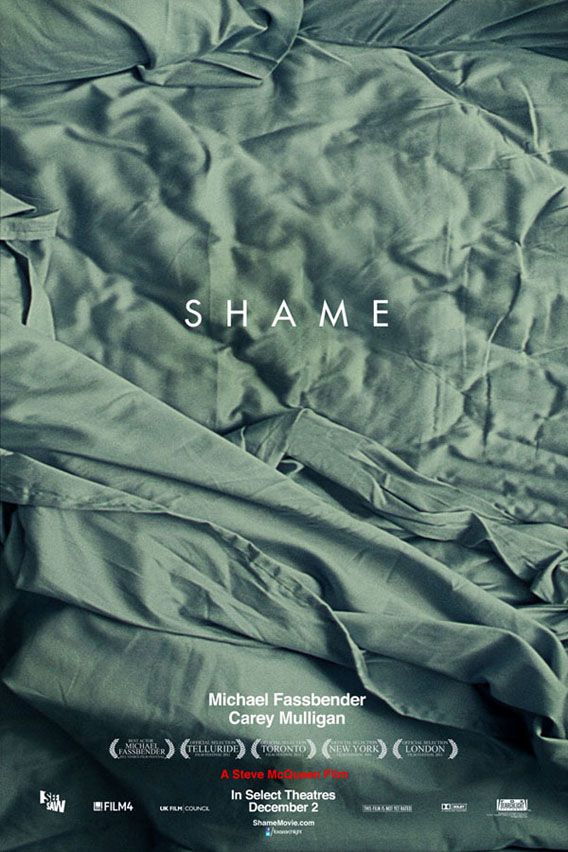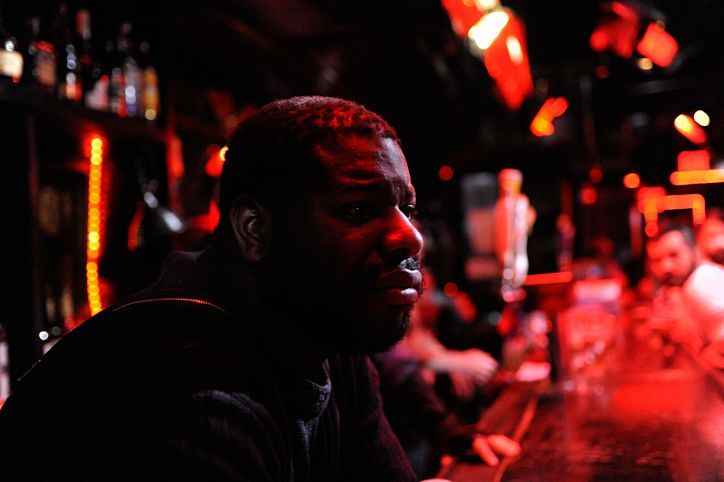Director Steve McQueen and actor Michael Fassbender joined members of the press after a special screening of their new film Shame at the 49th New York Film Festival.
I absolutely loved the film, a descent into the psyche of a man battling sexual addiction, which made their discussion all the more interesting. Shame marks the second pairing of McQueen and Fassbender, following the director's critically acclaimed 2008 debut Hunger.
“I said to Steve at the end of Hunger, ‘You know … you changed my life.’ Literally.” Fassbender recounted. “I mean, definitely in terms of a professional point of view, and I was getting to a point where I was 30 years old, the recession was just around the corner, which meant – the same as every other industry, less jobs for less actors. And for somebody to take a chance on an unknown actor, to give him the opportunity to take a risk, to play a lead in the film, you know – there was less and less of that happening. So, we – other then a sort of, I think, a big argument the first day of Hunger …” Fassbender laughed. McQueen interjected with a chuckle, “I remember it well.”
“I remember when I was 17 and I started off doing this,” Fassbender continued. “And my dream was to meet a director and have a relationship with a director. The things that I sort of looked at were Scorsese-De Niro, Lumet-Pacino, and that would be the ultimate … to have that sort of collaboration like that and to be on a wavelength that powerful with somebody. And you know, that’s what I was so lucky to find in Steve with Hunger.”
The power of the McQueen-Fassbender chemistry is even more apparent when taking into account the recent announcement that they'll work together on a third film, Twelve Years a Slave.
Anyone who’s read about Shame is aware that Fassbender appears fully naked – there’s been much ado about his full-frontal nudity. While posing a question, a journalist mentioned, “There’s a comment on the size of your forehead,” and Fassbender reflected the scope of the buzz, laughing and mumbling, “I thought you were going to say something else.” This good-humored atmosphere prevailed during the entire conversation – a strange juxtaposition to the subject matter being discussed.
McQueen divulged that Shame was originally meant to take place in London. “I didn’t want to come to New York to make a film, that was never my desire," he said. "The desire was to make a film about this particular subject matter and to set it in London. But guess what? No one wanted to talk to us. So it was very difficult, and all of a sudden we started to hit a wall, so … I asked to speak to some kind of specialist in the field … the two specialists we spoke to happened to be in New York … and that’s how we got access to people who have had the affliction and were dealing with the affliction – sexual addiction. And it was just amazing. … It didn’t feel alien at all, it didn’t feel sort of … bizarre or absurd, it felt very extraordinarily human.”
When asked what attracted him to the subject matter, McQueen cited Billy Wilder’s The Lost Weekend and Otto Preminger’s The Man with the Golden Arm as influences, saying, “What attracted me about this particular addiction was … in order to facilitate this addiction you need another person. So therefore, then you have drama in a nutshell, really. And that hadn’t been sort of looked at properly, in a way.”
Fassbender was remarkably good-humored when addressing his preparation for the role, quipping, “I just went out and had a lot of sex, and … um … just tried to sort of embrace it as best I could.” He then switched gears, saying that McQueen first mentioned the film's premise in 2008 and he signed on without even reading a script. “And preparation? I spent a lot of time with the script, pretty much the same with my preparation for most other jobs … and through re-reading … the character and the story starts to unravel itself and starts to sort of set into my enamel.”
He cited, as well, how important it was to speak with real-life sufferers of the affliction. “Meeting people helps of course. I always find it difficult when you meet people – the same situation I found when we were doing Hunger – asking people direct questions didn’t really work that well for me in both scenarios, but I always try and get people to tell me stories. I like stories – I like to tell them and I like to hear them. And when people tell stories they sometimes let their guard down and through that you can sort of get little like footnotes almost, little sort of motivations – you can see where sort of the essence of a personality is. And that was very helpful in terms of getting into the headspace of a character who can’t really deal with intimacy, somebody who doesn’t really like themselves … so it’s about sort of diffusing themselves.”
Delving a bit deeper, Fassbender discussed preparing with Carey Mulligan (who plays his sister): “There’s a real honesty between siblings, I think, and a real cruelty as well. Although there’s a very strong bond, but also there’s an awareness of all the weak points and how to hit them, and how to really strike home.”
McQueen interjected, ”It was interesting because myself, Carey and Michael have siblings of the opposite sex, so that was an interesting starting point as well.”
“Absolutely, yeah,” Fassbender agreed. Then, teasingly, he mumbled to McQueen, “Please don’t interrupt me again when I’m talking."
“So we sat down, the three of us, and we discussed where these people are coming from … where they are in their lives when we meet them in the film, what’s happened before," the actor continued. "A biography for me is always an important thing to do anyway, you know to sort of just get an idea and have a confidence of the character, and yes we discussed a lot of that and sort of how far we wanted to go with it, and we did a little bit of workshopping with some scenes. And then I also didn’t want to spend too much time with Carey as well because I wanted to keep that element of sort of awkwardness or … I don’t know how to describe it, that sort of … like a certain element of tension and a maturity. I wanted to sort of preserve that, and I think Steve felt the same. We did a couple of workshops and it was like, 'Okay, that’s enough. Let’s just wait until we get to the day of filming.'”
McQueen also addressed questions about the apparent sexual tension between siblings Brandon and Sissy. “Obviously, they’re of the opposite sex – brother and sister … the background has something to play in their relationship," he said. "There’s a background, to some extent – it’s one of those things where it’s in the air. You see what’s going on, but you can’t really put your finger on it. It’s like a wet piece of soap – you have a grasp, but no, it’s not there. It’s constantly moving, constantly adjusting and that’s life, I think, and also you can smell it but you can’t taste it – you can taste it but you can’t smell it. It’s there but it’s not there. And that’s how I sort of wanted to have that history. The history presents itself in the present, in different guises.”
When an audience member prodded further, citing a direct quote from the movie, when Sissy tells Brandon, “We’re not bad people, we just come from a bad place,” McQueen continued, “I wanted to make their background … what I’m doing is when people come to the cinema and sit down they’re bringing all their luggage, they’re bringing all their baggage, they’re bringing all their history … and they’re looking at people who are having conversations and they’re projecting the possibilities of what could’ve happened with Sissy and Brandon and that’s what I wanted. I wanted a situation that was more familiar to each individual here rather than mysterious or … sort of some long yarn about what happened or what could’ve happened.”
Despite the gritty subject matter, there’s a real undertone of tenderness to the characters and their plights – especially, much to Fassbender’s credit, Brandon. “The whole film is about trying to communicate in an emotional way,” McQueen said. “So, people write down this and that and the other but actually it’s just about human contact – and human contact where you can feel real, where you can feel alive. It’s just like, you know, the homeless guy on the street … he’s alive. Sometimes people don’t want to talk to him because he’s homeless … but if you give him contact, he realizes he’s alive. That’s what it’s about. Michael has the capability of that kind of tenderness. I feel that most great male actors are very feminine and very strong female actors are very masculine. And it’s the same with Carey and Michael. They have some kind of beauty, some kind of tenderness.”
Shame opens in theaters in December.



